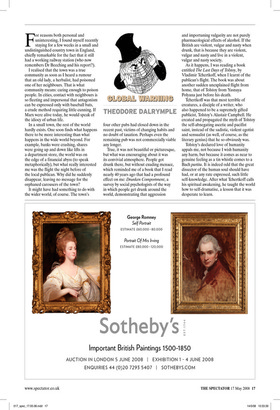global warning THEODORE DALRYMPLE
For reasons both personal and uninteresting, I found myself recently staying for a few weeks in a small and undistinguished country town in England, chiefly remarkable for the fact that it still had a working railway station (who now remembers Dr Beeching and his report?).
I realised that the town was a true community as soon as I heard a rumour that an old lady, a herbalist, had poisoned one of her neighbours. That is what community means: caring enough to poison people. In cities, contact with neighbours is so fleeting and impersonal that antagonism can be expressed only with baseball bats, a crude method requiring little cunning. If Marx were alive today, he would speak of the idiocy of urban life.
In a small town, the rest of the world hardly exists. One soon finds what happens there to be more interesting than what happens in the wide world beyond. For example, banks were crashing, shares were going up and down like lifts in a department store, the world was on the edge of a financial abyss (to speak metaphorically), but what really interested me was the flight the night before of the local publican. Why did he suddenly disappear, leaving no message for the orphaned carousers of the town?
It might have had something to do with
BRIT PICS_SPECTATOR:Q7 8/5/08 1
the wider world, of course. The town’s four other pubs had closed down in the recent past, victims of changing habits and no doubt of taxation. Perhaps even the remaining pub was not commercially viable any longer.
True, it was not beautiful or picturesque, but what was encouraging about it was its convivial atmosphere. People got drunk there, but without exuding menace, which reminded me of a book that I read nearly 40 years ago that had a profound effect on me: Drunken Comportment, a survey by social psychologists of the way in which people get drunk around the
8 Page 1
world, demonstrating that aggression and importuning vulgarity are not purely pharmacological effects of alcohol. If the British are violent, vulgar and nasty when drunk, that is because they are violent, vulgar and nasty and live in a violent, vulgar and nasty society.
As it happens, I was reading a book entitled The Last Days of Tolstoy, by Vladimir Tchertkoff, when I learnt of the publican’s flight. The book was about another sudden unexplained flight from home, that of Tolstoy from Yasnaya Polyana just before his death.
Tchertkoff was that most terrible of creatures, a disciple of a writer, who also happened to be a supremely gifted publicist, Tolstoy’s Alastair Campbell. He created and propagated the myth of Tolstoy the self-abnegating ascetic and pacifist saint, instead of the sadistic, violent egotist and sensualist (as well, of course, as the literary genius) that he so obviously was.
Tolstoy’s declared love of humanity appals me, not because I wish humanity any harm, but because it comes as near to genuine feeling as a tin whistle comes to a Bach partita. It is indeed odd that the great dissector of the human soul should have had, or at any rate expressed, such little self-knowledge. After what Tchertkoff calls his spiritual awakening, he taught the world how to self-dramatise, a lesson that it was desperate to learn.










































































 Previous page
Previous page